Photographs: Reuters Nikhil Lakshman in Sanya (China)
Rediff.com's Nikhil Lakshman, who is travelling with Prime Minister Manmohan Singh to the BRICS Summit in the Chinese town of Sanya, reports that the next BRICS Summit will be held in India in 2012 even as the five BRICS nations pledged to jointly work towards peaceful transformation of the world order.
Prime Minister Manmohan Singh said on Thursday that an agreement has been reached between BRICS nations -- India, Brazil, Russia, China and the newly inducted South Africa -- that will enable them to provide credit to each other in local currencies and collaborate in capital markets and other financial services.
He was addressing the plenary session of BRICS leaders in the Chinese town of Sanya.
The prime minister also said that India will host the next BRICS Summit in 2012. Dr Singh said that there will also be cooperation among the capital markets in BRICS countries.
The global recovery process will depend on how the economies of BRIC nations perform, Dr Singh added.
He said there was no role for complacency and the developments in the Middle East, North Africa and the tragic events in Japan had introduced fresh uncertainties in the economic recovery process.
. . .
BRICS to use own currencies for credit, grants
Photographs: Reuters
Dr Singh also pointed out that all BRICS nations are members of the UN Security Council and the nations would intensify consultations on global matters.
The prime minister also spoke of the challenges to the world from terrorism, and the need to reform institutions of global governance so that they are truly representative of contemporary realities.
Emphasising that BRICS economies occupy a strategic economic position, Prime Minister, Dr Manmohan Singh, today said that all these countries share the vision of inclusive growth and prosperity in the world.
Dr Singh said, "The challenge before us is to harness the vast potential that exists among us. We are rich in resources, material and human. We are strengthened by the complementarities of our resource endowments. We stand for a rule-based, stable and predictable global order."
"We respect each other's political systems and stages of development. We value diversity and plurality. Our priority is the rapid socio-economic transformation of our people and those of the developing world. Our cooperation is neither directed against nor at the expense of anyone," Dr Singh added.
Meanwhile, the five BRICS nations pledged to jointly work on global economic and political issues, with Prime Minister Manmohan Singh stressing that reform of the world bodies like the United Nations to make them truly representative.
. . .
BRICS to use own currencies for credit, grants
Image: Prime Minister Manmohan Singh and Brazilian President Dilma Rousseff at the BRICS Leaders Meeting.Photographs: Reuters
At the BRICS Summit in Sanya, the five economic powers unveiled a joint declaration and an action plan which calls for greater coordination among the member countries on issues ranging from combating terrorism to challenges on the food energy and food security front to cooperation on finance, agriculture and sports.
Concerned with the recent developments in West Asia and North Africa where people's uprising has caused major havoc not only in countries there but across the world as oil and other commodity prices soar, the BRICS leaders endorsed the need to resolve the issues -- like in Libya -- through 'peaceful means and dialogue' in which the UN and regional organisations should play an appropriate role.
"We are deeply concerned with the turbulence in the Middle East (West Asia), the North African and West African regions and sincerely wish that the countries affected achieve peace, stability, prosperity and progress and enjoy their due standing and dignity in the world according to legitimate aspirations of their peoples," the joint declaration said.
"We share the principle that the use of force should be avoided" and that the "independence, sovereignty, unity and territorial integrity of each nation should be respected," it added.
Addressing the media after the Summit, Dr Singh said that the leaders had reviewed the international situation, discussed international economic, financial and trade issues, the challenges of sustainable development, food security, energy security and climate change.
. . .
BRICS to use own currencies for credit, grants
Image: Prime Minister Manmohan Singh (L) is greeted by China's President Hu Jintao in Sanya.Photographs: Reuters
The leaders agreed to intensify consultations to address the major economic and political challenges that face their countries, he said at the media interaction along with Chinese President Hu Jintao, Russian President Dmitry Medvedev, Brazilian President Dilma Rouseff and South African President Jacob Zuma.
"I am deeply encouraged by the consensus among us of the need for an international order that is rule based and respects the unity, territorial integrity, sovereignty and independence of individual States," Dr Singh said.
The developments in West Asia and North Africa and the aftermath of the huge tragedy that befell Japan have introduced "fresh uncertainties" in the global economic recovery process, Dr Singh noted.
Earlier, Dr Singh said at the BRICS plenary session that "We should join hands in ensuring a peaceful and orderly transformation of the world order that reflects contemporary and emerging realities."
"This," he said, "should be the case whether it is the reform of political and security governance structures in the United Nations or the international financial, monetary or trade system."
"An important objective must remain the reform of institutions of global governance to make them truly representative of contemporary realities," Dr Singh said at the Summit where South Africa joined to make it a five-nation grouping of fastest growing economies of the world.
. . .
BRICS to use own currencies for credit, grants
Image: Prime Minister Manmohan Singh in Sanya.Photographs: Reuters
Noting that the BRICS countries share the vision of inclusive growth and prosperity in the world, he said the grouping stands for a rule-based, stable and predictable global order.
"We respect each other's political systems and stages of development. We value diversity and plurality. Our priority is the rapid socio-economic transformation of our people and those of the developing world. Our cooperation is neither directed against nor at the expense of anyone," he said.
Dr Singh referred to the Sanya Declaration and Action Plan, as "an extremely rich and ambitious agenda."
He said the BRIC nations have embarked on a major enterprise of socio-economic change for their peoples.
"Cooperation among BRICS holds the promise of building an external environment for ourselves that helps each of us and complements our task of nation building. To that extent I would say the best is yet to come," said Singh at the meet.

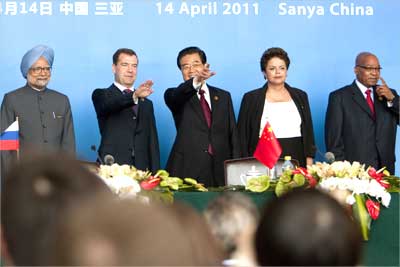
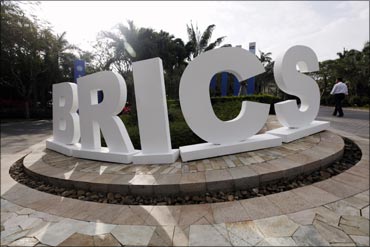
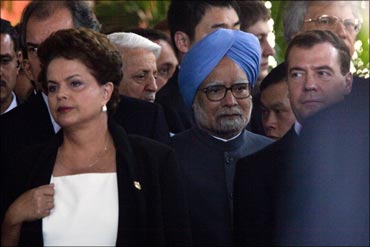
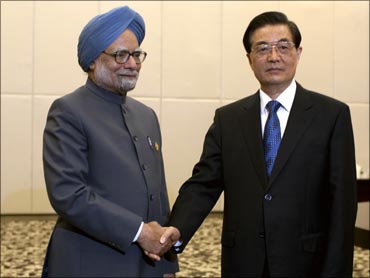
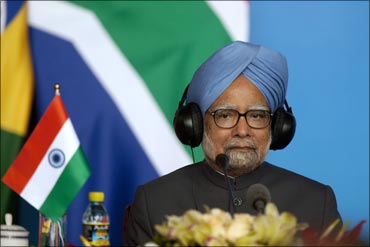
article